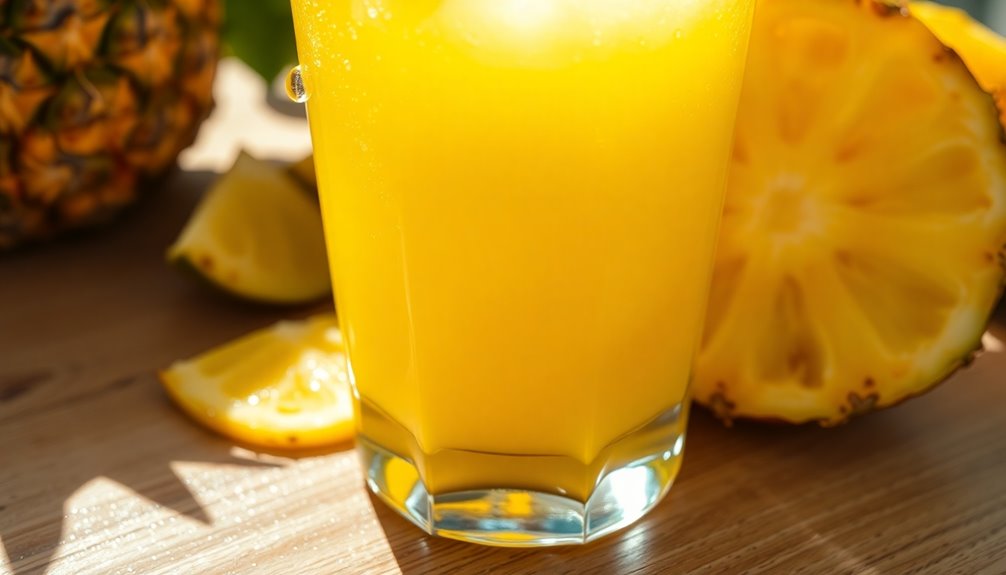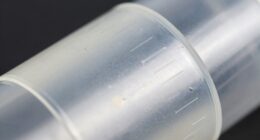Pineapple juice packs about 32 grams of carbohydrates in a 1 cup serving, which mainly comes from natural sugars like sucrose, glucose, and fructose. You'll find around 25 grams of total sugars in the juice, and it has low fiber content with just 0.5 grams. Since this juice is a tasty refreshment, it's essential to be mindful of your portion sizes. Stick around to discover more about the nutritional benefits and tips for enjoying pineapple juice!
Key Takeaways
- One cup (8 fl oz) of canned, unsweetened pineapple juice contains 32 grams of total carbohydrates.
- The majority of carbohydrates in pineapple juice come from natural sugars, totaling approximately 25 grams.
- Pineapple juice has low fiber content, with only 0.5 grams per serving.
- One cup of pineapple juice provides around 130 calories, important for dietary planning.
- Moderation is recommended to manage carbohydrate intake effectively while enjoying the juice.

Have you ever wondered how many carbs are in pineapple juice? If you're keeping an eye on your carbohydrate intake, it's essential to know what you're getting when you pour yourself a glass of this tasty drink. A standard serving of canned, unsweetened pineapple juice, which is about 1 cup or 8 fl oz, contains a total of 32 grams of carbohydrates. That's a significant amount, especially if you're trying to manage your daily diet.
Most of the carbohydrates in pineapple juice come from natural sugars. In fact, you'll find that there are about 25 grams of total sugars per serving. These sugars are primarily made up of sucrose, glucose, and fructose, which are the natural sugars found in the fruit itself. It's important to note that the juice has a very low fiber content, providing only 0.5 grams. This low fiber means that when you calculate net carbs, you're looking at the full 32 grams of carbohydrates. If you're counting carbs, you'll want to factor that in when planning your meals or snacks.
For those who are mindful of added sugar in their nutrition, it's good to remember that unsweetened pineapple juice doesn't have any extra sugars added. All the sweetness comes from the fruit itself. While it's delicious and refreshing, if you're aiming for a lower carbohydrate option, you might want to consume it in moderation. Balancing it with other foods that are lower in carbs can help you stay within your daily limits while still enjoying the flavor.
Pineapple juice is also a fantastic source of vitamin C, which is important for your immune system and overall health. If you're considering ways to incorporate this juice into your diet, think about using it in delicious recipes. You can add it to smoothies, marinades, or even salad dressings for a burst of flavor. Just remember to keep an eye on the serving size, as it can be easy to pour more than the recommended cup.
When factoring in calories, one cup of pineapple juice typically contains around 130 calories. This can be a worthwhile addition to your diet if you're looking for something refreshing and nutritious. However, if you're consuming calories a day with a focus on weight management or specific dietary goals, it's crucial to account for the carbohydrates and sugars in your overall intake.
Frequently Asked Questions
Is Pineapple Juice Good for Keto Diet?
If you're following a keto diet, pineapple juice isn't a great choice.
With its high carbohydrate content, it can hinder your ability to achieve ketosis. You'll find that the sugars in the juice can spike your blood sugar levels, making it hard to maintain low insulin levels.
Instead, consider low-carb alternatives that align better with your dietary goals, allowing you to enjoy a variety of flavors without compromising your keto lifestyle.
Is Pineapple Juice High in Carbs?
Imagine diving into a tropical paradise, surrounded by the sweet scent of ripe pineapple.
But wait! Is pineapple juice high in carbs? Absolutely! Packed with about 32 grams of carbs in just one cup, it's like sipping on a sugar bomb.
Most of that comes from natural sugars, making it a no-go for low-carb diets. If you're watching your carb intake, you might wanna rethink that refreshing drink!
Is Pineapple OK on Low Carb Diet?
If you're on a low-carb diet, you can enjoy pineapple, but moderation's key.
Fresh pineapple offers fiber and nutrients, which help balance its natural sugars. Just remember to keep your portions small to avoid exceeding your carb limits.
Pineapple juice, however, is generally best to avoid due to its high sugar content.
Focus on whole fruit instead, so you can benefit from its health perks without derailing your dietary goals.
What Is the Carb Count in Dole Pineapple Juice?
When you’re curious about the carb count in Dole Pineapple Juice, you’ll find it contains 32 grams of total carbohydrates per 8 fl oz serving. This translates to roughly 4 grams of carbohydrates per ounce, making it relatively high in sugar content. For those comparing beverages, the carbohydrate content in orange juice is similarly substantial, often containing around 26 grams of carbohydrates per 8 fl oz serving. It’s essential to consider these figures, especially for individuals monitoring their carbohydrate intake for dietary reasons.
Most of these carbs come from natural sugars, with 25 grams of sugar included. Specifically, you'll get 12 grams of sucrose and 10 grams each of glucose and fructose.
If you're tracking your carb intake, this juice can significantly impact your daily allowance, especially on low-carb diets.
Conclusion
In conclusion, pineapple juice packs about 33 grams of carbs per cup, making it a sweet treat but one to enjoy in moderation. If you're watching your carb intake, you might want to consider how it fits into your overall diet. Isn't it fascinating how something so delicious can also have such an impact on your nutrition? Remember, balance is key, so savor each sip while keeping your health goals in mind!
Cindy thoroughly researches juicing trends, techniques, and recipes to provide readers with practical advice and inspiration. Her writing style is accessible, engaging, and designed to make complex concepts easy to understand. Cindy’s dedication to promoting the advantages of juicing shines through her work, empowering readers to make positive changes in their lives through the simple act of juicing.











